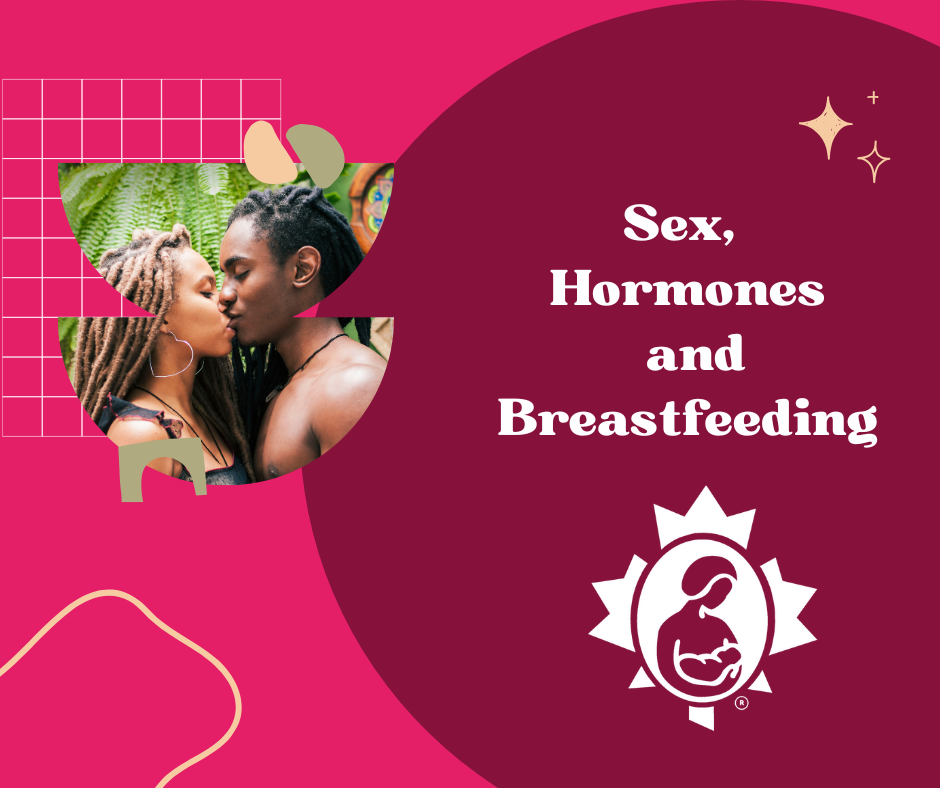
It is not surprising that breastfeeding, which is hormonally driven, would have an impact on your sexuality, which is also hormonally driven. However, many new mothers aren’t prepared for the effect that having a new baby can have on their desire for sex.
Some of the changes in how you might feel and respond are simply a result of being tired from giving birth and the work of caring for a baby. With a first baby, there is also the change from being a couple or single person, focused on each other, to being a family with an intense focus on your newborn. These non-hormonal changes affect all new parents, regardless of how the baby is being fed or how your baby came into your family.
The hormones involved in breastfeeding may have a dampening effect on your sexual desire in the early months. Intimacy is more likely to occur when both you and your partner are feeling rested and supported by each other in your parenting and other roles. You may feel, or have been told, that stopping nursing will resolve the decreased sex drive you are experiencing. While stopping breastfeeding will change your hormonal environment, stopping breastfeeding before you are ready may make you feel resentful or unhappy. Those negative feelings may reduce your desire for intimacy.
It can be helpful to take time, outside of the bedroom, to talk to each other about your feelings around parenthood, intimacy, needs and desires. As your baby grows and changes, your time, energy and ability to focus on something (or someone) other than your baby will change too.
Like all aspects of being a parent, finding time for intimacy and sex will be an ever-changing reality as your children grow and circumstances change. It can be helpful for you and your partner to have a sense of humour. There are going to be times when you are interrupted by your crying baby. It is much easier to stay “in the mood” if the two of you can laugh off the interruption. Sometimes it can be helpful to consider windows of time other than bedtime. Early morning or during your baby’s afternoon nap might be options. Intimacy is not just about sex. Take time to enjoy little moments throughout the day: a hug, a kiss, a private joke, letting your partner know that you find them attractive. These little things can keep you feeling connected even when you don’t have time for sex.
Talking to others about breastfeeding, parenting and how to balance life as a couple and a family can help put things in perspective. La Leche League Canada meetings provide a safe and caring space where you can talk about the joys and challenges of nursing and parenting. La Leche League Canada Leaders are also available by phone or email if there isn’t a meeting happening in your neighbourhood. You can also find breastfeeding information and read stories from others on our website.
Here is a look at the hormones involved in breastfeeding and how they may impact your sexual feelings and desires.
Estrogen: All women have low levels of estrogen for the first couple of months after giving birth. Continued breastfeeding extends this period for at least six months. For a few women, lower levels may last as long as they are nursing. Lower estrogen levels may cause vaginal dryness, tightness and tenderness. If water-based lubricants are not helpful, talk to your healthcare provider about estrogen-based cream or suppositories. Research has found them helpful without affecting milk supply.
Oxytocin: The milk ejection reflex (‘letdown’) is triggered by the release of the hormone oxytocin. This can cause your milk to start leaking from your breasts. Oxytocin is also released in men and women at the time of orgasm and is known to increase bonding. Many women never leak milk during sex, but it does happen to some women. If you or your partner has concerns about leaking milk during lovemaking, you can feed your baby or express milk beforehand to reduce milk flow. Direct pressure on the nipple with the heel of the hand can stop your letdown. Or you can keep a towel handy to deal with leaking milk.
Prolactin: Prolactin levels rise during pregnancy and increase sharply in the few days immediately following birth. These rising hormone levels are responsible for the production of large amounts of milk.. Prolactin’s effect is strongest in the early weeks. Following this sharp rise, prolactin levels decrease about 50% after the first week postpartum. These levels will continue to decrease over the time that you breastfeed. But they will stay elevated until your child is completely weaned.
Prolactin levels rise and fall throughout the day when your baby is nursing or milk is being expressed. The level peaks about 45 minutes after your baby starts to feed and returns to normal (‘baseline’) levels within a few hours. This effect is strongest in the early weeks when your body is establishing how much milk your baby needs. Prolactin impacts the production of other sex hormones. Higher levels of prolactin decrease the levels of the sex hormones estrogen and testosterone.
Testosterone: This is an androgen hormone which is usually thought of as a male hormone. It is also naturally occurring in the female body where it is produced in the ovaries and adrenal glands. Testosterone appears to contribute positively to the health of vaginal tissue and to contribute to genital sexual arousal.
Please consider supporting LLLC.
Reference
Mohrbacher, Nancy. (2020). Breastfeeding Answers: A Guide for Helping Families, Second Edition. Nancy Mohrbacher Solutions, Inc.
Updated 2024
